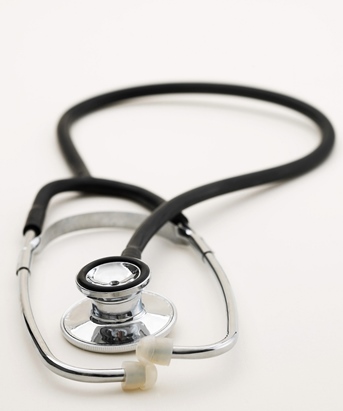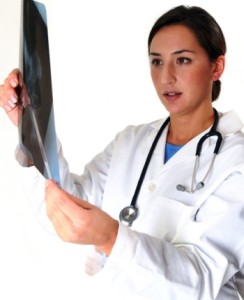
I am a practicing emergency physician and a managing partner with Emergency Physicians Medical Group (EPMG) and we provide emergency medical services to hospitals throughout the Midwest. I would like to share some of my own experiences when the tables turned and this doctor became the patient. What followed was an eye-opening sequence of events that illustrate how an otherwise great institution can still miss the mark.
 As a 46-year-old, I had lived a seemingly healthy life until about six months ago when I experienced progressively worsening shortness of breath, to the point I could not climb stairs or ride a bike. I reluctantly sought an appointment with a primary care physician and was told I would have to wait three weeks. While awaiting that appointment, I progressed to feeling lightheaded and had a nearly passed out while shoveling snow from my driveway. I was scheduled for a meeting at an EPMG hospital and decided to check in for a chest x-ray, thinking it would be a good screening tool for anything serious. If it was OK, I could simply wait for my appointment. Reminded by an astute EPMG physician that, “Today you are not my boss, but my patient,” I deferred the decision making to my physician. After a normal PA/Lateral CXR, she ordered a cat scan of my chest to determine the cause of my symptoms. Reluctantly, I agreed to the test and to my surprise, a 6.8 cm thoracic aneurysm was identified. With that, my life would change dramatically.
As a 46-year-old, I had lived a seemingly healthy life until about six months ago when I experienced progressively worsening shortness of breath, to the point I could not climb stairs or ride a bike. I reluctantly sought an appointment with a primary care physician and was told I would have to wait three weeks. While awaiting that appointment, I progressed to feeling lightheaded and had a nearly passed out while shoveling snow from my driveway. I was scheduled for a meeting at an EPMG hospital and decided to check in for a chest x-ray, thinking it would be a good screening tool for anything serious. If it was OK, I could simply wait for my appointment. Reminded by an astute EPMG physician that, “Today you are not my boss, but my patient,” I deferred the decision making to my physician. After a normal PA/Lateral CXR, she ordered a cat scan of my chest to determine the cause of my symptoms. Reluctantly, I agreed to the test and to my surprise, a 6.8 cm thoracic aneurysm was identified. With that, my life would change dramatically.
Good-Bye Control, Hello Anxiety
As someone who is accustomed to being in charge, I found myself overcome by my own anxiety. As my emotions supplanted rational thought, I had racing thoughts of why this was happening to me? Should I be grateful this was found, or angry that I have this at all? I have four, young children and my lovely wife is a superstar, but even she needs my help from time to time. This is not a good time for me to be laid up – let alone thinking of death. One doesn’t generally consider the prospect of dying until it is right in front of you. I was woefully ill-prepared for this process.
Generally “cool under pressure,” I struggled to focus as my cardiologist speculated that I had a congenital bicuspid valve that went unnoticed for years until the aneurysm stretched my aortic root to the point that the valve was rendered incompetent. I was essentially in heart failure and surgery would be my only option.
Faced with ‘No Alternative’
I then met with a cardiovascular surgeon who described the planned repair. No alternative options were provided. I would require open-heart surgery in which my aortic root, valve, and aorta would be removed and replaced with a single prefabricated unit. This option essentially yielded a biologic valve adapted from a cow or pig and would replace my current aortic valve. This only option would afford me 10-15 years of good service, without the need for anticoagulation. Additional questioning revealed that I would require another open-heart surgery in 10-15 years. Yikes! Immediate surgery was recommended. All that was required was my consent.
Providence Intervenes
To this day, I don’t know why I hesitated, but it was all happening so fast. I was more than an hour from home and my wife wanted me transferred somewhere closer. As I considered my options, I received a call from an old friend whom I had trained with and was now at a prestigious institution on the East Coast. It was a fortuitous call, as I would soon learn that I did have options.
I was advised of the possibility of aortic valve repair, otherwise known as the David Procedure. The beauty of this procedure is that it repairs your native valve. Thus, there is no need for life-long anticoagulation and the lifespan of your native valve appears to be unaffected by the surgery, with a four percent risk of reoperation after 20 years. I was frustrated to think this option was available, yet not offered. Was this not important information for a patient? As I learned of this option, and with the support of my healthcare team and family, the decision was made to transfer my care to this institution which was remotely located from my home.
Competent, Reassuring Care
I was very impressed when I initially arrived at the hospital. Everyone seemed to be on the same page. I could not tell the difference between the techs and the nurses, because everyone was consistent in their message. No matter who came in, they knew the plan was to keep my blood pressure below 150 and my heart rate below 60. This was highly reassuring and the communication was constant. Everyday there was a plan that was shared with me and I knew exactly what to expect. Within the first two days, I felt most assured by the care I was receiving.
Check-box Efficiency
 As surgery approached I took note of something. Operationally, this place was splendid. They were fast and efficient. They had huddles and team sign outs at change of shift. Very impressive stuff. But what was lacking was that no one ever asked the very basic question – how was I doing? How was my family, what about my work, what were my expectations and how was I coping with possible bad outcomes? Sure, I was offered Last Rites and communion because I registered as a Catholic. I was even offered Reiki and massage therapy prior to surgery. But these were “service lines” that were presented like a menu. If I wanted something, I could check the box.
As surgery approached I took note of something. Operationally, this place was splendid. They were fast and efficient. They had huddles and team sign outs at change of shift. Very impressive stuff. But what was lacking was that no one ever asked the very basic question – how was I doing? How was my family, what about my work, what were my expectations and how was I coping with possible bad outcomes? Sure, I was offered Last Rites and communion because I registered as a Catholic. I was even offered Reiki and massage therapy prior to surgery. But these were “service lines” that were presented like a menu. If I wanted something, I could check the box.
Missed Opportunities
I recall turning to my wife with a quizzical look, “Are they serious?” Don’t get me wrong, the service offerings were great, but outside of the context of a personal treatment plan, it all made little sense to me. I’m here for a life-saving operation and they want to do a massage? The point is that the hospital operations were excellent. They had thought enough about the patient to offer more than just surgery. The staff clearly worked hard to create an efficient environment with a few “bells and whistles.”
Yet, my only concerns heading into surgery were classic. What will happen to my kids if I don’t make it? How will my wife cope with the loss? Assuming things go well, how will I transition back to work? What will it be like recovering at home with four kids? If anyone had bothered to scratch the surface, they would realize how little their massage or Reiki service really meant to the anxious patient.
A Patient-Centered Experience
The most important thing to me the night before surgery was to see my kids back home. Wi-Fi was weak and Skype was interrupted. What a great service this would have been to offer. Roll in a big screen and schedule a family encounter for the patient. Depression before and after cardiac surgery is well recognized. I was never offered the services of a counselor or psychiatrist and never once asked about my emotional well-being. These are not just opportunities lost, these were issues core to my experience and detracted from what would otherwise a hugely successful surgery.
When the time came to decide on the type of valve I should receive, should I need one, my surgeon and I disagreed. I wanted tissue and he wanted mechanical. Without any discussion (he’s a surgeon after all), he said “Think about it and let me know tomorrow.” My surgery was scheduled for 6 AM the next day, and as I lie on the operating table, I told him I wanted a tissue valve. I received no education and no counseling on what was arguably the most important decision of my life. I’m happy to say, the operation was an unqualified success and they spared my native valve, so the decision was moot, but the process was still frustrating.
Patients: Our Most Valuable Advisors
What I have learned through this experience is that as hospitals and providers strive to create institutions that are operationally excellent, we may still miss the mark if we do not know what is really important to the patient. The patient must be part of the process and influence the decision for us to achieve meaningful outcomes. As we engage consultants on how to make processes more cost-effective and efficient, the patients are likely our most valuable advisors.





2 Comments
Excellent post. Gets right to the heart of “What Matters to You?” and shared-decision making. Very glad the outcome was superb. Thank you for sharing your story.
An awesome post. And, as a resident of the Chicago area, one that gives pause.